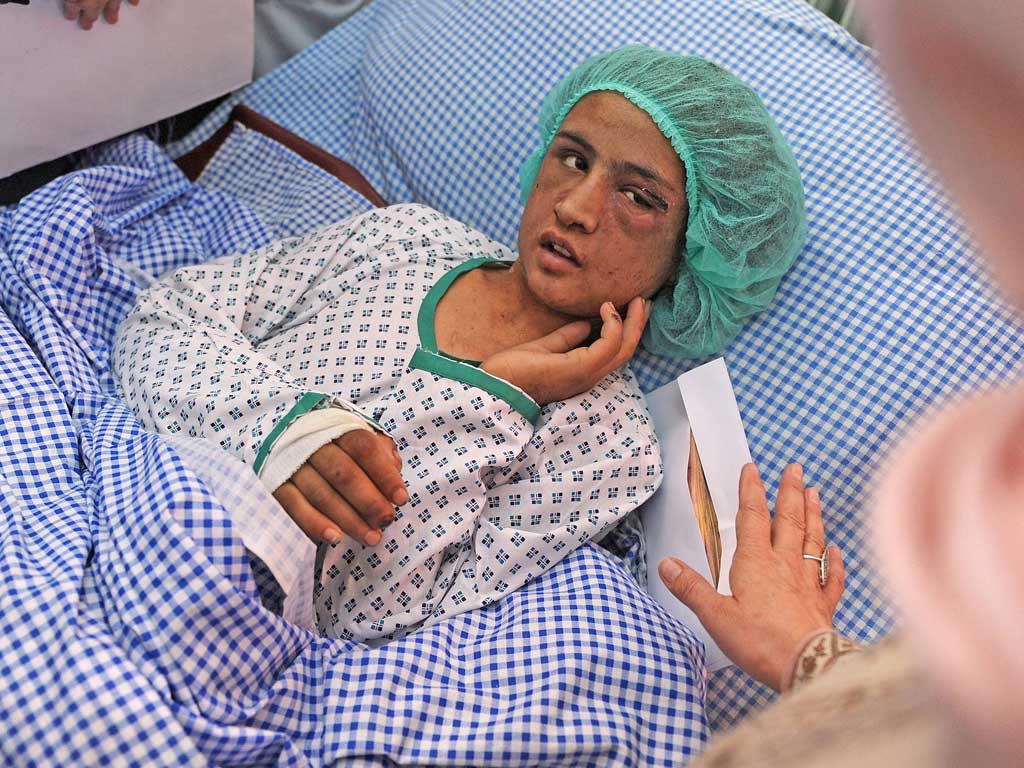Justice for Sahar Gul: Afghan family who tortured child bride jailed for 10 years
15-year-old still fears her abusers who were jailed after case drew worldwide attention

Your support helps us to tell the story
From reproductive rights to climate change to Big Tech, The Independent is on the ground when the story is developing. Whether it's investigating the financials of Elon Musk's pro-Trump PAC or producing our latest documentary, 'The A Word', which shines a light on the American women fighting for reproductive rights, we know how important it is to parse out the facts from the messaging.
At such a critical moment in US history, we need reporters on the ground. Your donation allows us to keep sending journalists to speak to both sides of the story.
The Independent is trusted by Americans across the entire political spectrum. And unlike many other quality news outlets, we choose not to lock Americans out of our reporting and analysis with paywalls. We believe quality journalism should be available to everyone, paid for by those who can afford it.
Your support makes all the difference.Three relatives of Sahar Gul, the child bride whose case caused worldwide outrage after she was rescued – tortured and starved – from a filthy basement in northern Afghanistan last year, have each been sentenced to 10 years in prison for human rights abuses.
The 15-year-old was found in a cellar in Baghlan province last December after her uncle tipped off police. Following an arranged marriage, Ms Gul's husband and his family kept her in isolation for five months, with barely enough food to survive, and tortured her because she refused to enter into prostitution.
In one of the most extreme examples of domestic violence exposed in Afghanistan, Ms Gul's in-laws pulled out her fingernails, beat her, broke her fingers and burned her body with hot pokers.
Ms Gul attended the sentencing, coming face to face with her husband's mother, father and sister for the first time since she was rescued. In court, she pulled off her headscarf to show the judge the scars on her scalp, face and neck inflicted during her ordeal. She asked the judge to punish her relatives by imposing the death penalty.
Ms Gul's representatives said the 10-year sentence handed down to each member of her husband's family was nowhere near long enough and they are appealing for harsher punishment.
"She said she was happy they were all put in jail," said Huma Safi of Women for Afghan Women, which runs the half-way house where Ms Gul was taken to recover after leaving hospital. She has since received intensive psychological counselling and physical therapy.
"I saw the happiness on her face – but also the fear," Ms Safi said. "The fear that in 10 years they will be able to leave jail. Ten years is not a long time. She said: 'Look how old I am. Ten years will go past very fast'."
Ms Gul's husband, a soldier in the Afghan army, and her brother-in-law fled when she was rescued and remain on the run. They were found guilty in absentia and presiding judge Sibghatullah Razi said the pair would be sentenced when they were caught.
Heather Barr, a researcher for Human Rights Watch Afghanistan, said the sentences were encouraging because they showed that "at least in this instance, the prosecutors have taken an act of violence against women seriously".
"That's a positive – but I'm afraid it's atypical," Ms Barr said. "This case is unusual in the amount of publicity it received but not unusual in the type of horrible acts that were involved. The challenge is to make sure that the law on the elimination of violence against women is implemented in all cases of violence against women, not just the unusual cases that receive media attention."
Over the past decade, since the Taliban were ousted from power, the situation for women in Afghanistan has improved. As many as four million girls now attend school, and women are employed in a variety of jobs. Although she refused to consider it at first, Ms Gul is now thinking about beginning her education.
However, activists believe more work must be done to address issues such as underage marriage, "honour" killings and the use of women to settle debts. Although the legal age for marriage in Afghanistan is 16, the UN estimates that half of girls marry before they are 15.
Ms Gul's case was one of three instances of horrific violence against women that made worldwide headlines at the end of last year. In November, the plight of Gulnaz came to light. Although she had been raped and impregnated by her cousin's husband, Gulnaz was imprisoned for adultery.
In December, three men doused a 17-year-old girl and her family in acid, in revenge for her refusal to marry an ageing suitor. Perhaps the most notorious case in recent years, however, is that of Bibi Aysha, whose mutilated face appeared on the cover of Time magazine. Her husband cut off her nose and ears and left her for dead after she ran away from home.
4 million: Estimated number of girls now attending school. Education of girls was banned under the Taliban
Join our commenting forum
Join thought-provoking conversations, follow other Independent readers and see their replies
Comments